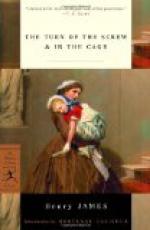of helping him to slip them over to her. What
was most extraordinary in this impression was the
amount of excuse that, with some incoherence, she
found for him. He wanted to pay her because there
was nothing to pay her for. He wanted to offer
her things he knew she wouldn’t take. He
wanted to show her how much he respected her by giving
her the supreme chance to show
him she was
respectable. Over the dryest transactions, at
any rate, their eyes had out these questions.
On the third day he put in a telegram that had evidently
something of the same point as the stray sovereigns—a
message that was in the first place concocted and that
on a second thought he took back from her before she
had stamped it. He had given her time to read
it and had only then bethought himself that he had
better not send it. If it was not to Lady Bradeen
at Twindle—where she knew her ladyship
then to be—this was because an address to
Doctor Buzzard at Brickwood was just as good, with
the added merit of its not giving away quite so much
a person whom he had still, after all, in a manner
to consider. It was of course most complicated,
only half lighted; but there was, discernibly enough,
a scheme of communication in which Lady Bradeen at
Twindle and Dr. Buzzard at Brickwood were, within
limits, one and the same person. The words he
had shown her and then taken back consisted, at all
events, of the brief but vivid phrase “Absolutely
impossible.” The point was not that she
should transmit it; the point was just that she should
see it. What was absolutely impossible was that
before he had setted something at Cocker’s he
should go either to Twindle or to Brickwood.
The logic of this, in turn, for herself, was that
she could lend herself to no settlement so long as
she so intensely knew. What she knew was that
he was, almost under peril of life, clenched in a situation:
therefore how could she also know where a poor girl
in the P.O. might really stand? It was more
and more between them that if he might convey to her
he was free, with all the impossible locked away into
a closed chapter, her own case might become different
for her, she might understand and meet him and listen.
But he could convey nothing of the sort, and he only
fidgeted and floundered in his want of power.
The chapter wasn’t in the least closed, not
for the other party; and the other party had a pull,
somehow and somewhere: this his whole attitude
and expression confessed, at the same time that they
entreated her not to remember and not to mind.
So long as she did remember and did mind he could
only circle about and go and come, doing futile things
of which he was ashamed. He was ashamed of his
two words to Dr. Buzzard; he went out of the shop
as soon as he had crumpled up the paper again and thrust
it into his pocket. It had been an abject little
exposure of dreadful impossible passion. He
appeared in fact to be too ashamed to come back.
He had once more left town, and a first week elapsed,




